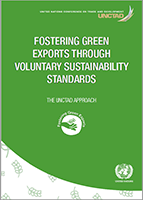
The 2030 Agenda and its Sustainable Development Goals (SDGs) set the world on the path of sustainable development and give international trade an important role to play in this journey:
“International trade is an engine for inclusive economic growth and poverty reduction, [which] contributes to the promotion of sustainable development”
(Paragraph 68, the 2030 Agenda for Sustainable Development)
How can international trade become a driving force for a development as sustainable as it is inclusive, ensuring that no one is left behind? How can it respond to the growing demand for production, exchange and consumption patterns that are both environmentally and socially sustainable as well as economically profitable?
To help developing countries build their capacity to achieve sustainable and inclusive growth through trade, UNCTAD has examined ways for fostering green exports via exploiting voluntary sustainability standards (VSS). To this end, UNCTAD has worked with three countries in the Asia-Pacific Region and developed an approach, which is ready-to-use and adaptable to local specificities.
Objectives of the project:
-
To maximize the benefits of VSS to smallholder producers and micro and small businesses in developing countries diversifying into “green” exports.
-
To promote a bottom-up approach through multi-stakeholder dialogue and collaboration on implementing VSS as a tool to foster green exports and sustainable development.
-
To increase information and transparency on VSS to local stakeholders in order for them to be proactively engaged in standard-setting and impact assessment.
UNCTAD’s approach and tools:
Over the past few decades, gains from trade-led growth have helped move millions out of poverty in developing countries. At the same time, increases in production and trade have led to overuse of natural resources, increased emissions, and in some cases increased inequalities. Developing countries still depend heavily on natural resource-based products for their exports and growth. Thus, greening global trade will be important for achieving sustainable development.
VSS can be used as a tool to increase economic gains for producers and to transmit the gains from trade to social and environmental sustainability. However, smallholder producers and micro businesses in developing countries face capacity gaps in capturing the potential of VSS to catalyse sustainable development through trade.
In order to bridge these gaps, UNCTAD has developed an approach to make the best use of VSS as a tool to foster the development of green exports, contributing to the achievement of the Sustainable Development Goals.


